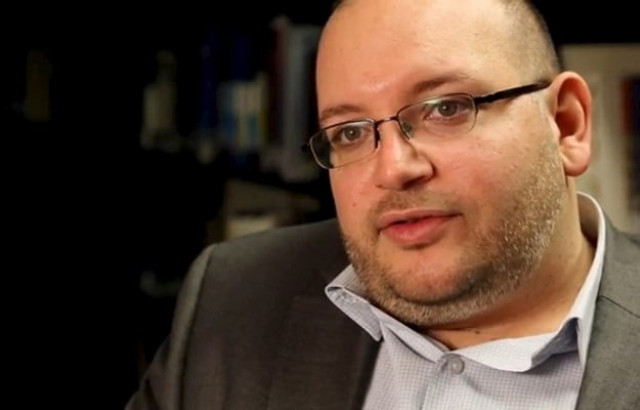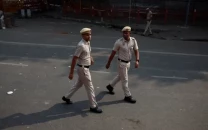Washington Post reporter on trial in Iran for spying
Correspondent Jason Rezaian was presented with the charges against him, including espionage

Washington Post reporter Jason Rezaian speaks in the newspaper's offices in Washington, DC in a November 6, 2013 file photo provided by The Washington Post. PHOTO: REUTERS
The United States blasted the trial's "complete lack of transparency", and renewed calls for Tehran to drop "absurd" spying charges.
Rezaian's wife, Yeganeh Salehi, who is also a journalist, appeared in court alongside her husband and a female press photographer, Iran's official IRNA news agency reported.
The trial is being held in Branch 15 of the Tehran revolutionary court, which usually presides over political cases or those related to national security.
The first session ended after about three hours, according to MizanOnline, a news agency linked to the judiciary.
Rezaian was presented with the charges against him, including espionage, the report said.
It said Rezaian had yet to submit his defence and that the date of the next hearing would be announced later.
The United States said it was monitoring the case "as closely as possible".
"While we call for this trial to be open, we also maintain that Jason should never have been detained or put on trial in the first place," National Security Council spokeswoman Bernadette Meehan said.
Rezaian, an Iranian-American, has been held since July last year in a politically sensitive case that has unfolded while Iran and world powers conduct nuclear talks.
Read: Egypt to put Al Jazeera journalists on trial
Tehran does not recognise dual nationality, and says the case is a purely Iranian matter.
Rezaian's wife, who worked for the English-language newspaper The National based in Abu Dhabi, was arrested along with him but released on bail after spending two and a half months in custody.
Rezaian, 39, is accused of "espionage, collaboration with hostile governments, gathering classified information and disseminating propaganda against the Islamic republic", according to his lawyer Leila Ahsan.
The reporter's American mother, Mary, has been in Iran for the past two weeks awaiting the trial. There was no immediate word on whether she had been permitted to attend.
"The fact that Jason's trial has been closed to the public, including Jason's immediate family, fits the pattern of a complete lack of transparency and lack of due process that we've seen since Jason was first detained," Meehan said in a statement.
"We continue to call for all of these absurd charges to be dropped and for Jason to be released immediately."
State media gave no details of Tuesday's hearing and no indication of how long the trial might last.
But it will overlap with the final stretch of negotiations between Iran and the major powers aimed at reaching a comprehensive agreement on Tehran's nuclear programme by a June 30 deadline.
Read: Iran dismisses execution sentence on US-Iranian national
Meehan on Tuesday insisted that on the sidelines of the talks, US officials "always raise the cases of detained and missing US citizens with Iranian officials".
Rezaian's case has been played out in the Iranian media, where he has been accused of spying and passing information about Iran to US government officials.
Among the offences he is alleged to have committed is writing a letter to US President Barack Obama.
The Washington Post's executive director, Martin Baron, said the newspaper had tried to obtain a visa for a senior editor to travel to Iran but its request was never acknowledged.
"There is no justice in this system, not an ounce of it, and yet the fate of a good, innocent man hangs in the balance," said Baron.
"Iran is making a statement about its values in its disgraceful treatment of our colleague, and it can only horrify the world community."
Rezaian has been held in Tehran's notorious Evin Prison and relatives have frequently expressed fears for his health, citing his need for medication to combat high blood pressure.
The California-born journalist is one of four Americans Obama has urged Iran to return home.
The others are pastor Saeed Abedini, in jail for more than two years after being convicted of undermining national security, and former US Marine Amir Hekmati, who is serving 10 years for cooperating with hostile governments.
A fourth American, retired FBI agent Robert Levinson, went missing in southern Iran eight years ago.



















COMMENTS
Comments are moderated and generally will be posted if they are on-topic and not abusive.
For more information, please see our Comments FAQ